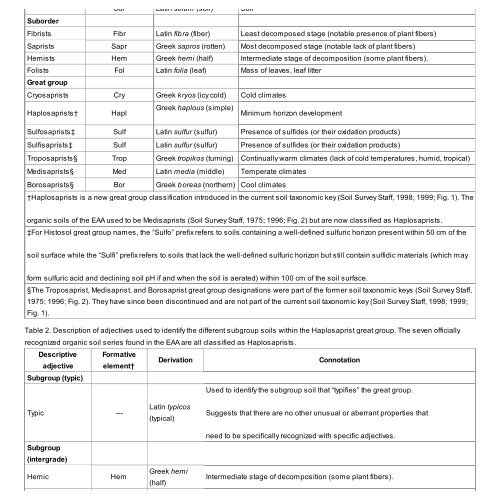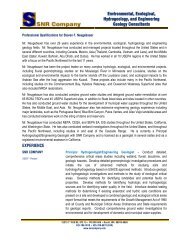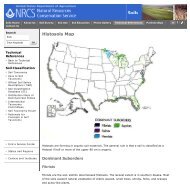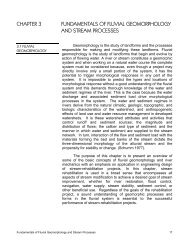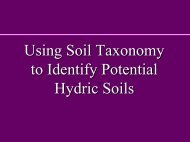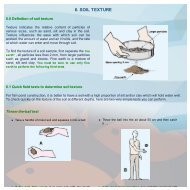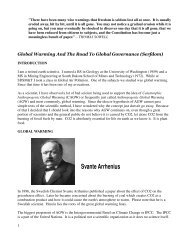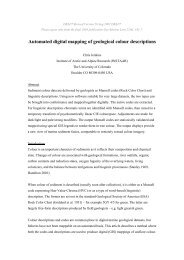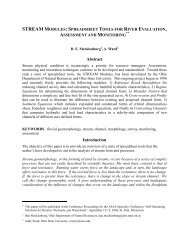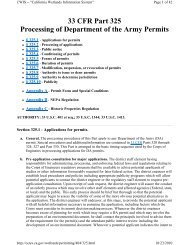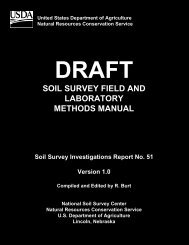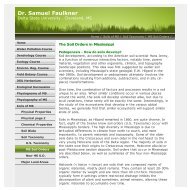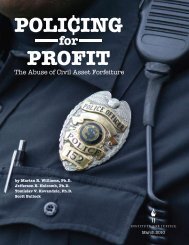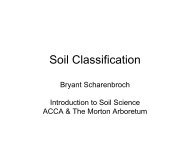SSAGR246_AG151_ Application of the Soil Taxonomy Key to the ...
SSAGR246_AG151_ Application of the Soil Taxonomy Key to the ...
SSAGR246_AG151_ Application of the Soil Taxonomy Key to the ...
Create successful ePaper yourself
Turn your PDF publications into a flip-book with our unique Google optimized e-Paper software.
Sol Latin solum (soil) <strong>Soil</strong><br />
Suborder<br />
Fibrists Fibr Latin fibra (fiber) Least decomposed stage (notable presence <strong>of</strong> plant fibers)<br />
Saprists Sapr Greek sapros (rotten) Most decomposed stage (notable lack <strong>of</strong> plant fibers)<br />
Hemists Hem Greek hemi (half) Intermediate stage <strong>of</strong> decomposition (some plant fibers).<br />
Folists Fol Latin folia (leaf) Mass <strong>of</strong> leaves, leaf litter<br />
Great group<br />
Cryosaprists Cry Greek kryos (icy cold) Cold climates<br />
Haplosaprists† Hapl<br />
Greek haplous (simple)<br />
Minimum horizon development<br />
Sulfosaprists‡ Sulf Latin sulfur (sulfur) Presence <strong>of</strong> sulfides (or <strong>the</strong>ir oxidation products)<br />
Sulfisaprists‡ Sulf Latin sulfur (sulfur) Presence <strong>of</strong> sulfides (or <strong>the</strong>ir oxidation products)<br />
Troposaprists§ Trop Greek tropikos (turning) Continually warm climates (lack <strong>of</strong> cold temperatures, humid, tropical)<br />
Medisaprists§ Med Latin media (middle) Temperate climates<br />
Borosaprists§ Bor Greek boreas (nor<strong>the</strong>rn) Cool climates<br />
†Haplosaprists is a new great group classification introduced in <strong>the</strong> current soil taxonomic key (<strong>Soil</strong> Survey Staff, 1998; 1999; Fig. 1). The<br />
organic soils <strong>of</strong> <strong>the</strong> EAA used <strong>to</strong> be Medisaprists (<strong>Soil</strong> Survey Staff, 1975; 1996; Fig. 2) but are now classified as Haplosaprists.<br />
‡For His<strong>to</strong>sol great group names, <strong>the</strong> “Sulfo” prefix refers <strong>to</strong> soils containing a well-defined sulfuric horizon present within 50 cm <strong>of</strong> <strong>the</strong><br />
soil surface while <strong>the</strong> “Sulfi” prefix refers <strong>to</strong> soils that lack <strong>the</strong> well-defined sulfuric horizon but still contain sulfidic materials (which may<br />
form sulfuric acid and declining soil pH if and when <strong>the</strong> soil is aerated) within 100 cm <strong>of</strong> <strong>the</strong> soil surface.<br />
§The Troposaprist, Medisaprist, and Borosaprist great group designations were part <strong>of</strong> <strong>the</strong> former soil taxonomic keys (<strong>Soil</strong> Survey Staff,<br />
1975; 1996; Fig. 2). They have since been discontinued and are not part <strong>of</strong> <strong>the</strong> current soil taxonomic key (<strong>Soil</strong> Survey Staff, 1998; 1999;<br />
Fig. 1).<br />
Table 2. Description <strong>of</strong> adjectives used <strong>to</strong> identify <strong>the</strong> different subgroup soils within <strong>the</strong> Haplosaprist great group. The seven <strong>of</strong>ficially<br />
recognized organic soil series found in <strong>the</strong> EAA are all classified as Haplosaprists.<br />
Descriptive Formative<br />
adjective element†<br />
Derivation<br />
Connotation<br />
Subgroup (typic)<br />
Used <strong>to</strong> identify <strong>the</strong> subgroup soil that “typifies” <strong>the</strong> great group.<br />
Typic ---<br />
Latin typicos<br />
(typical)<br />
Suggests that <strong>the</strong>re are no o<strong>the</strong>r unusual or aberrant properties that<br />
need <strong>to</strong> be specifically recognized with specific adjectives.<br />
Subgroup<br />
(intergrade)<br />
Hemic<br />
Hem<br />
Greek hemi<br />
(half)<br />
Intermediate stage <strong>of</strong> decomposition (some plant fibers).<br />
Greek hals


